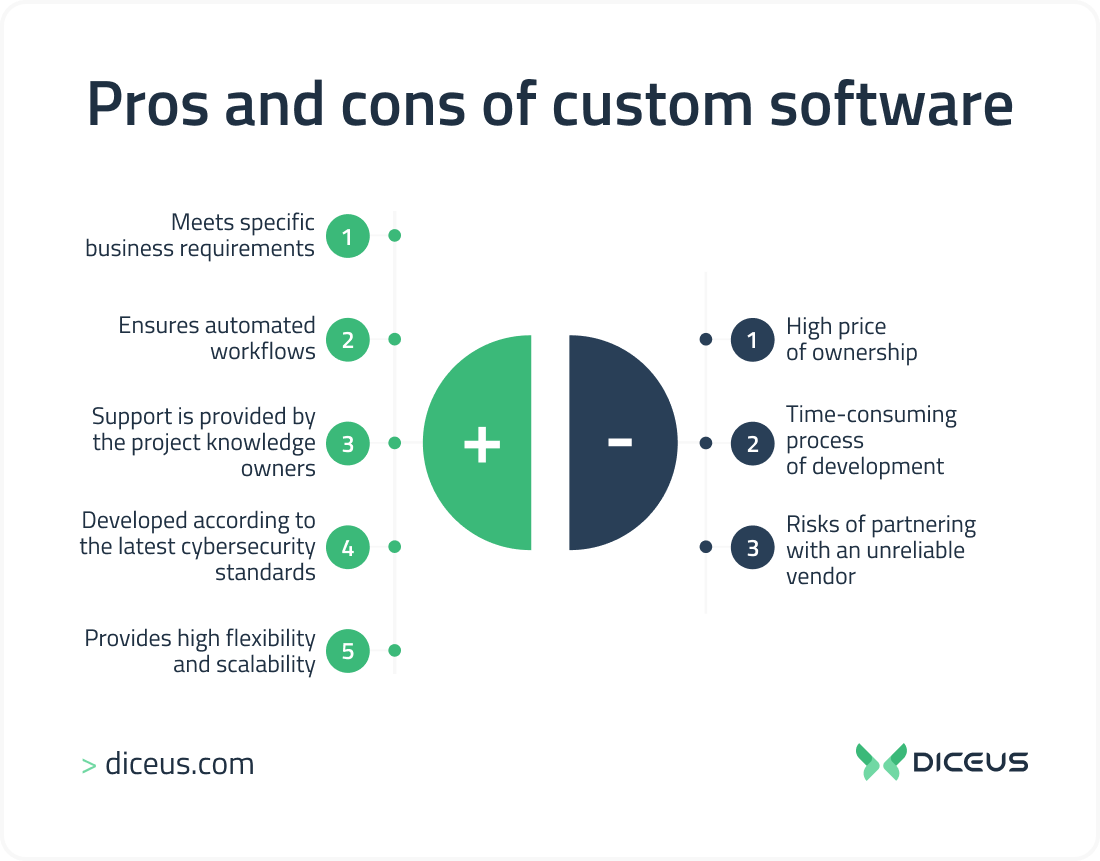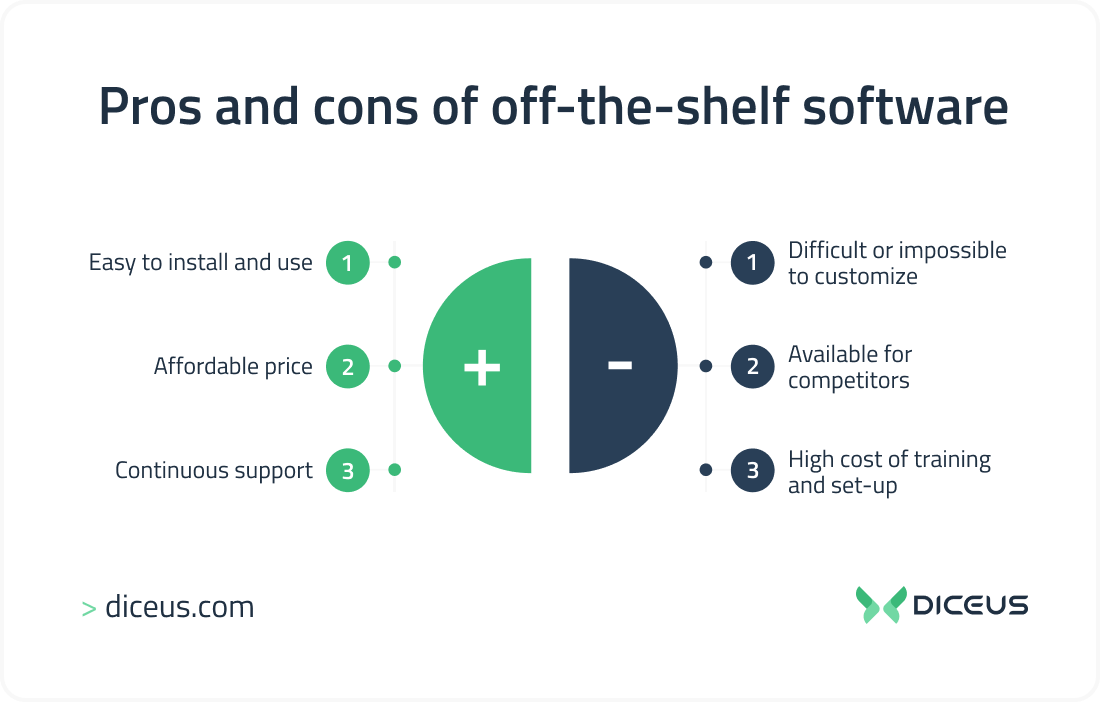

Custom development vs off-the-shelf software: What is the main difference?
Up-to-date business needs efficient software to solve a scope of critical tasks, from data management and customer service improvement to all sorts of internal processes. The market offers a wide range of paid and free ready-made software products. Many companies create custom platforms or integrate with the services of third-party developers in unique ways. Which option is best for your company?

Here, you will find the answer and understand what works best for you. Let’s cover the main aspects of comparing custom software vs. off-the-shelf solutions, which should help you make a well-informed choice.
Need a reliable software development partner? Book a free call to get professional consulting and assistance!
Custom software development definition
Custom solutions are created from scratch based on particular business’s individual demands, adapted to existing business processes, and allow you to launch new digital workflows quickly. A personalized product, developed according to the client’s wishes, is usually intended for internal use, not for sale or distribution.
Specialized features and unique tools are custom-made and owned by the same company. The great thing is that pinpointed capabilities are usually employed to the max, guaranteeing the top level of effectiveness and no excessive functionality or hidden costs. The interface is designed specifically for the company’s employees and clients, and the functionality can be changed in accordance with shifting business requirements.
Custom development involves either creating a new application or extending the capabilities of an existing one. The process can be handled by both internal and external teams.
Learn more about our custom software development services.
Pros and cons of custom software
Before you decide whether you need a unique software product or not, you should clarify all the sides of the bargain.

Advantages of custom software
Here are the key pros of building custom software solutions.
Individuality
Custom applications are initially adapted to your business processes. The development starts with an in-depth business analysis aimed at finding out what challenges a business faces, how current software is used, and what goals should be addressed with the help of a new solution. Custom software is created with a set of pre-defined functionalities that are needed to meet the company’s goals and needs.
Ease of use
Custom software is built with regard to the specific needs of the people who will use it. A specially outlined design ensures fewer errors and a quick adaptation to your employees’ and customers’ workflows.
High compatibility and autonomy
Integrate and expand software in whichever way you see fit while automating many underlying tasks.
Greater competitiveness
You get practically unlimited personalization opportunities to make the application more customer-oriented and improve it as needed.
Increased flexibility and scalability
Only you decide what, how much, and when to change, getting flexible platform migration opportunities and simple scaling in line with emerging challenges.
Higher profitability
No need to pay for access and extra features. Custom software has functionality needed by your company only.
Disadvantages of custom software
Along with advantages, tailor-made software has some disadvantages.
High costs
Custom development is not cheap, so the initial price will be higher than any subscription option.
Time to develop
Custom development can be a complex and lengthy process that takes months or even years.
Tech trendiness
To avoid possible restrictions on business, trends and dynamics of technological development must be taken into account.
Explore dozens of successful projects we completed.
When should you consider custom software development?
A custom approach is your win-win solution in cases where readymade software pieces just don’t do the trick to fully satisfy your requirements and the expectations of your customers. So, if you are looking for a custom-tailored and high-performing solution, the custom software is your best bet.
From the perspectives of designing, building, maintaining, and promoting products, a bespoke solution will be unique in the long run and provide a competitive advantage for your company. Here are the most frequent use cases of custom software development services:
- You run a complex, very specific business that calls for unique software functionality.
- The workflows in your organization are dynamic and may shift periodically.
- Multiple tools are needed to handle different stages of the same process.
- You need tech capabilities that can be easily integrated with other software systems.
- You are looking for the most gradual learning curve so that the finished solution is easy to use for employees or customers.
- Your business features the use and work with highly personalized data.
- The company workflow needs to be modernized, digitized, or automated.
- Your existing software systems and IT infrastructure need an upgrade.
- You struggle using tons of readymade software pieces for various business operations.
- Your business grows and requires more capabilities for scalability.
Custom software grows and develops along with your business, making it the best long-term solution in many cases.
Examples of custom software
Bespoke software offers solutions adapted to your business specifics. Most often, it is used in the following fast-growing niches:
- Banking/financial services
- Healthcare
- Insurance
- Retail and logistics
Highly successful market giants commonly prefer custom (or heavily customized) solutions — for instance, Amazon, eBay, YouTube, Netflix, Uber, etc.
Custom software costs
Custom software development is more expensive than readymade software and takes more time to implement. However, there is no universal method for determining the total cost of ownership. The following factors usually affect the price:
- Complexity of development
- Project scope
- Design requirements
- Integration with other systems
- Data migration
- Implementation timeline
- Required training
- Post-development maintenance and upgrades
The cumulative cost of all these elements during the software lifecycle determines the final cost of owning a custom platform. It is clear that we are talking about both relatively small and completely astronomical amounts.
Read how to estimate software development costs.
Off-the-shelf software meaning
Off-the-shelf solutions are completely readymade products with expanded functionalities that satisfy many users. They are not unique but universal and designed for mass commercial use, so they can usually be easily integrated with existing systems without complicated configurations.
A large selection of software modules allows you to meet specific needs, but standard features are not always enough for complex specific tasks. You can customize them, but you will not be able to fully adapt to all requirements with most off-the-shelf products.
Pros and cons of off-the-shelf software
Readymade solutions have a range of significant advantages that make them an attractive option for most startups, medium- and even large-scale enterprises and organizations. Let’s look at both sides of the bargain to get a balanced picture.

Advantages of off-the-shelf software
Immediate availability
You do not have to develop any software of your own, just launch a product and start working.
Initial cost-effectiveness
The cost of ownership is much lower than that of custom-built software. This is facilitated by flexible pricing packages and free trial periods. You pay only for using the platform, with the price usually based on the number of users. Most solutions offer a free or discounted trial, allowing you to test the product before purchasing it.
Versatility
Since developers aim to meet the needs of wider user audiences, you can get multi-purpose, feature-rich solutions off the shelf. You may not use their whole functionality, but different plans help define the range of features to pay for.
Ease of use
The interface is designed for intuitive use by inexperienced users who may need extra instructions and clarifications. All updates are automated.
Professional support
The software can be deployed by a professional team, and tech issues can be solved remotely without the involvement of your own specialists. Support is constantly busy seeking flaws and responding to user complaints.
Large user communities
Dedicated communities provide invaluable help in the form of clarifications and life hacks that make it easier to interact with certain software for greater efficiency.
Off-the-shelf software disadvantages
Scaling costs
Initially, off-the-shelf is a cheaper product, but its underlying costs may accumulate over time due to the need for constant service payments, licensing, and connection of additional users. An expansion of features and move to upgraded software versions will certainly boost the cost of your initial tariff plan, too.
A forced trade-off
The available features may or may not fully meet your needs, so you lose some flexibility of purchase. You will have to adapt or radically change workflows to fit the software, not vice versa.
Complete dependency on the provider
The solution will be updated and changed at any moment its vendor decides to, without the consent of your enterprise modernization plans. Some updates may adversely affect your system. There is also a risk that in case of financial difficulties, the software developer may stop supporting the application, and you will have to look for an alternative vendor.
Lack of flexibility and scalability
The product may not be sufficiently or poorly compatible with existing systems. Moreover, this problem can progress after updates, and you will practically not be able to influence it. In the same way, when you want to expand the functionality, you may not find exactly what you need among the options offered by the provider.
Off-the-shelf software use cases
Multi-purpose solutions are perfect for companies that need to quickly present and develop a project in the face of a lack of budget and in-house IT specialists. A cheap and cheerful solution, as they say, with no unnecessary risks and worries involved.
This is why off-the-shelf products are heavily preferred by startups, companies embarking on a digitalization journey, and cautious entrepreneurs who do not want to invest too much in their products before seriously adjusting business processes.
In general, readymade products suit those who intend to meet the bulk of their business needs cost-efficiently, optimize routine activities, and save vital resources. That is why complete products are preferred by the overwhelming majority of companies today.
Most will be subject to updates that you can use for free. This allows you to stay in the digitalization trend and discover new ways to solve your business problems.
Examples of off-the-shelf software
Off-the-shelf software solutions are designed for a broad audience of users, so they are always distinguished by their extraordinary ease of use and almost absolute accessibility. Such solutions may include:
- Mail services (e.g., Gmail)
- Media players (e.g., VLC, etc.)
- Editor programs (e.g., Photoshop)
- Antiviruses (e.g., Norton)
- Operating systems (e.g., Windows)
- Accounting applications (e.g., Tally)
- CRM systems and more
Cost of off-the-shelf solutions
Off-the-shelf software development is cheaper than buying and maintaining a specialized software infrastructure. Fixed payments can be paid monthly, quarterly, or yearly according to the subscription plan. Also, the software provider may charge you for the initial installation and configuration according to your needs. As a rule, there are no hidden fees. Well, unless there are license fees.
You pay for all available functionality by default, although you are unlikely to use everything you get. Inconsistencies and incompatibility with your systems can cause workflow interruptions, leading to certain time/cost losses. Most importantly, you don’t get much of a boost to your competitive edge. Still, whether it is worth saving when choosing custom vs off-the-shelf software is solely up to you.
Summary
Both custom and off-the-shelf products are used quite widely, although the choice is primarily determined by the scale, goals of ongoing projects, and the needs of specific businesses. Understanding the difference between the concepts, you are often left to decide which type to choose and which professionals to turn to on your own.
At DICEUS, we can guide you across software solutions that make the best fit for all relevant industries and build exactly what you need, guaranteeing high quality, strict deadlines, and reasonable costs. Get a free consultation to figure out the intricacies of choosing off-the-shelf vs custom software and achieve a perfect solution for your business.
FAQ
What is custom development?
Custom development is the process of designing, building, deploying, and maintaining tailored software for a specific set of users, functions, or organizations. Unlike commercial off-the-shelf software (COTS), custom development focuses on a highly specialized set of requirements.
What is off-the-shelf software?
Off-the-shelf describes any software solution, usually a commercial one, developed for the mass market. It is a readymade product that you can buy freely, but not created specifically for your needs.
Why is off-the-shelf software more expensive than custom SaaS?
More specifically, off-the-shelf software can be bought for less than custom-made software, but you will have to renew your subscription or pay license fees in the future. Also, in the long run, you will have to bear the cost of additional solutions to make up for the lack of functionality or incomplete compliance with the requirements.
How should organizations decide between custom and off-the-shelf software?
First, an organization should define their needs and make a list of necessary software features. Depending on the industry the company operates in, features may be quite specific. For example, an insurance company will definitely need some features to manage claims submitted by their customers while providing self-service capabilities to the latter. Second, it is worth exploring what advanced technologies are available to differenciate in the market. Third, discover costs. Comparing custom solutions and ready-made ones, think of the most efficient product for your business today and in the long run.
How does the level of customization software impact user satisfaction?
Customer satisfaction and loyalty may be defining for business profitability, so customization and excellent customer experience should be paid due attention to. Tailor-made solutions offer better means for customization as compared to the ready-made products. Businesses can create design that will be fully aligned with their design, tone of voice, branding, etc.





